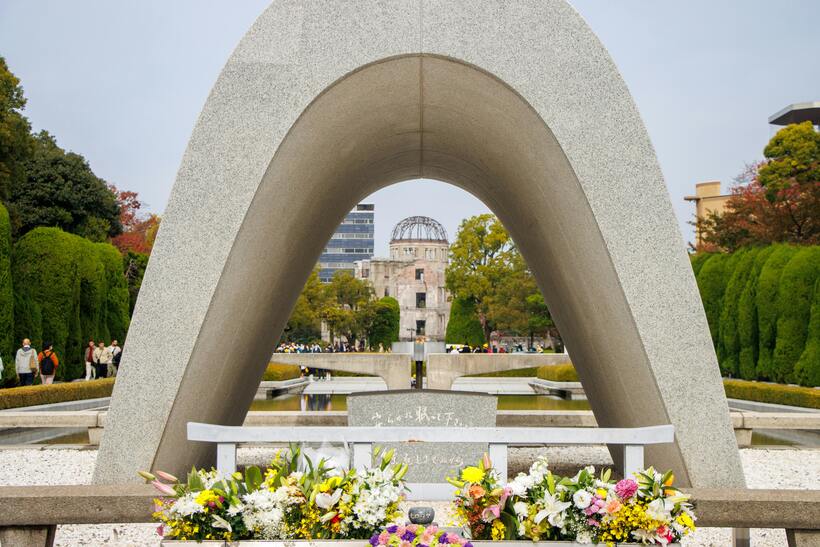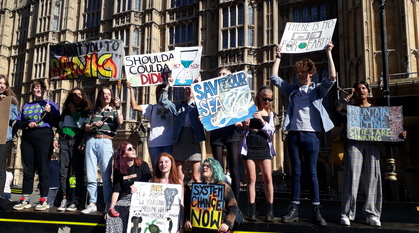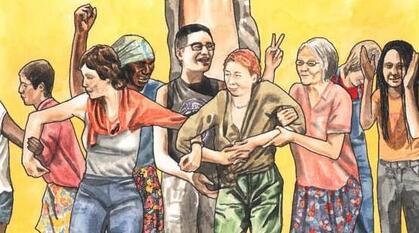Why we must build a world free from nuclear weapons
On the 80th anniversary of the bombing of Hiroshima, Oliver Robertson traces the history of opposition to nuclear weapons, and how Quakers continue that tradition today.

While the number of nuclear weapons has fallen globally, they are still a threat to all life on earth. We must learn from history, and from efforts towards disarmament.
“Remember your humanity and forget the rest!" This rallying cry was the heart of the 1955 Russell-Einstein Manifesto, a warning from scientists about the dangers of nuclear weapons and other weapons of mass destruction. It led directly to the Pugwash Conferences on Science and World Affairs, which brought together scientists from both East and West (or “Communist and anti-Communist" in the words of the manifesto) and led to many of the treaties limiting and reducing nuclear weapons in the world. Pugwash, together with its most active member Joseph Rotblat, were awarded the Nobel Peace Prize in 1995.
This document was remembered and celebrated last month at the Royal Society in London. It comes at a time when the risks of nuclear weapons are perhaps being forgotten by the public – though not officials: former Defence Secretary Des Browne discussed the briefing that he got about what exactly those weapons do, received when newly into his job. “I say to you from a personal perspective, nothing prepares you for the responsibility of having nuclear weapons."
While the details of that briefing, given to all Secretaries of State for Defence, remain confidential, there are nonetheless numerous videos and accounts online that explain what happens during and after a nuclear bomb is detonated. Distressing as some of them are, it's important to be aware of what we're dealing with, and to understand why it (correctly) remains such an existential issue for so many.
While there has been a major fall in the estimated number of nuclear weapons globally, from around 65,000 at its peak to a fifth of that (13,000) today, this is still enough to destroy all life many times over. Even in 1955, noted the manifesto, there were bombs with 2,500 times the destructive power of the Hiroshima atom bomb. We hear occasional talk of 'tactical' or 'battlefield' nuclear weapons that are small enough to use in a conventional war: in reality they are no such thing. Their yield (destructive power) varies between a “fraction of 1 kiloton to about 50 kilotons", whereas the largest conventional bomb ever dropped was 0.011 kilotons and the Hiroshima bomb had 15 kilotons.
The world was clearly aware of the dangers of nuclear weapons from the start. The first ever UN General Assembly resolution included a call to ban nuclear weapons. (There is a fascinating and brief history of nuclear weapons here.) Various international treaties committed countries with nuclear weapons to limit their numbers and use, and to negotiate in good faith for their elimination, while countries without were banned from acquiring them.
Disturbingly, that's not the way things are going. When Einstein and Russell (plus nine other less-well-known scientists) penned their manifesto in 1955, there were three nuclear weapon states: the USA, Russia and the UK. Today there are believed to be nine (in order of presumed acquisition): USA, Russia, the UK, France, China, Israel, India, Pakistan, North Korea. Many of these states are updating or expanding their arsenals, while almost all of the treaties limiting them have expired.
We are seeing this move towards nuclear expansion in Britain, where the previous Conservative government ended a decades-long process of reducing the number of nuclear warheads and instead committed to growing the UK's nuclear arsenal from 180 to 260 warheads. The current Labour government has also committed to purchasing F35-A warplanes that can fire nuclear missiles, alongside the longstanding submarine-based Trident missiles. An ecumenical vigil last weekend at the Trident submarine base at Faslane in West Scotland sought to highlight the dangers and inhumanity of these weapons.
There is learning that we all need to do: learning about what nuclear weapons are and do, and learning (relearning) our shared humanity. The first is an intellectual exercise, but the second is as much an act of the heart and spirit. It gives people the courage to recognise and resist when things are wrong: Joseph Rotblat was the only member of the Manhattan Project, the USA's 1940s nuclear weapons programme, to resign on ethical grounds. (The Quakers in Britain peace education team published a teaching pack on the atomic scientists as part of their Teach Peace resource.) And it gives people the wisdom to see what is important and what is not: “Remember your humanity and forget the rest!"


